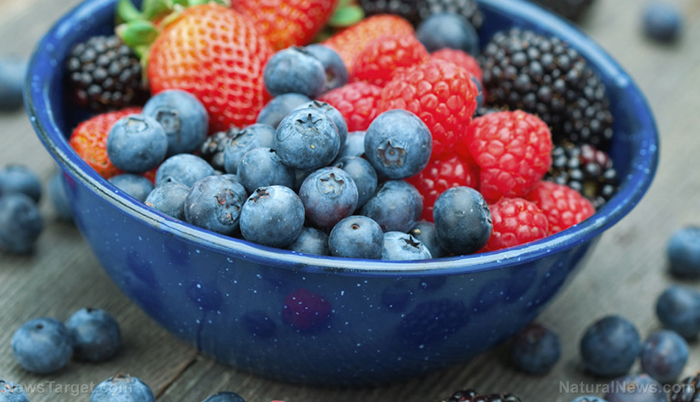![]() Home > Health
Home > Health
These Superfoods Can Help Reduce Cancer Risk, Studies Show

News Target | Natural News
![]() February 9th, 2023 | 15:25 PM |
February 9th, 2023 | 15:25 PM | ![]() 291 views
291 views
NATURALNEWS
Researchers say not all cancers can be prevented. But adding some healthy superfoods to your diet, maintaining a healthy weight and following a healthy lifestyle can help lower your risk of developing cancer.
Wellness dietician Lindsey Wohford pointed out that the foods that typically fight cancer are rich in phytochemicals.
Add the following superfoods to your diet to help reduce your risk of cancer:
Arugula
Arugula is full of antioxidants and contains glucosinolates, which your body breaks down into a range of beneficial compounds, including sulforaphane – the active compound that directly eliminates carcinogens from the body and provides a protein that inhibits tumor growth.
Researchers in a study published in the journal Current Pharmacology Reports have found that sulforaphane inhibits the enzyme histone deacetylase, which is involved in the progression of cancer cells.
Avocado
Research has shown that the phytochemicals in avocados may selectively inhibit cancer cell and pre-cancer cell growth, as well as induce apoptosis or cell death in certain cancer cells, including cervical, colon, pancreatic, prostate and stomach cancers.
A study published in the journal Biomolecules indicated that avocados also contain high levels of naturally occurring carotenoids (pigments) that exert a potent anti-cancer capacity in various cancer models by modulating the signaling pathways involved in the migration and invasion of cancer cells and its metastatic progression or the spread of cancer cells.
Berries’
Berries, including blackberries, blueberries, cherries, cranberries, currants, hawthorn berries and raspberries, are antioxidants rich in flavonoids, which are well known to be crucial in the prevention of cancer. So pop a berry or two daily for optimal cancer protection.
An antioxidant called pterostilbene, found in high quantities in blueberries, has anti-cancer fighting properties. Cranberries, meanwhile, contain a “drugstore’s worth of cancer-fighting natural chemicals,” according to registered dietitian-nutritionist Joy Bauer.
Pulses
Pulses are the nutritionally dense edible seeds of annual plants in the legume family that grow in pods and come in a variety of colors, shapes and sizes.
According to the American Institute for Cancer Research, the best cancer-fighting foods include beans, particularly black beans, red kidney beans, pinto beans, red lentils and yellow split peas, which are all top sources of anthocyanins (in red and black beans), dietary fiber, flavan-3-ols, folate, lignans, phenolic acids, resistant starch, phenolic acids, phytic acid, saponins and tannins (especially proanthocyanidins) that fight cancer.
Quinoa
Quinoa is rich in a phytonutrient called carotenoids that have been shown to help reduce the risk of breast cancer, lung cancer and ovarian cancer. A research article published in the Journal of Cellular and Molecular Biology indicated that quinoa seed extract induces apoptosis in lung cancer cells.
Researchers added that quinoa is rich not only in macronutrients (including bioactive protein, high-quality fatty acids, polysaccharides, and dietary fiber), but also in vitamins, essential amino acids, minerals, phytoecdysteroids, phytosterols, polyphenolic compounds (flavonoids, phenolic acids, tannins) and saponins – all contributing to biological functions that include anti-carcinogenic, antioxidant, antimicrobial and anti-inflammatory effects.
Sweet potatoes
A study published in the Journal of Cancer Prevention reported that a group of antioxidants found in purple sweet potatoes called anthocyanins, protect against colorectal cancer by inducing cell cycle arrest and antiproliferative and apoptotic mechanisms.
Another study published in the same journal reported that sweet potatoes are also packed with lutein and carotenoids that starve cancer cells by interfering with estrogen-dependent tumor growth associated with breast cancer in pre-menopausal women.
Tree nuts
Emerging research, including a study published in the journal Toxins, shows that ellagitannins (found in walnuts, hazelnuts and cashews), gamma-tocopherol (found in black and English walnuts, pecans, pistachios) and melatonin (found in almonds, pistachios, walnuts) reduce the risk of common forms of cancer.
Other important phytochemicals that contribute to the chemopreventive efficacy and the anticancer activity of ellagitannins include flavonoids, indoles, isothiocyanates, polyphenols and retinoids.
The world today makes being healthy difficult, but there are things you can control, such as your diet and lifestyle. Exercise regularly, quit smoking, avoid alcohol and eat nutritious foods rich in anticancer components to lower your risk of developing cancer.
Source:
courtesy of NATURALNEWS
by Olivia Cook
If you have any stories or news that you would like to share with the global online community, please feel free to share it with us by contacting us directly at [email protected]